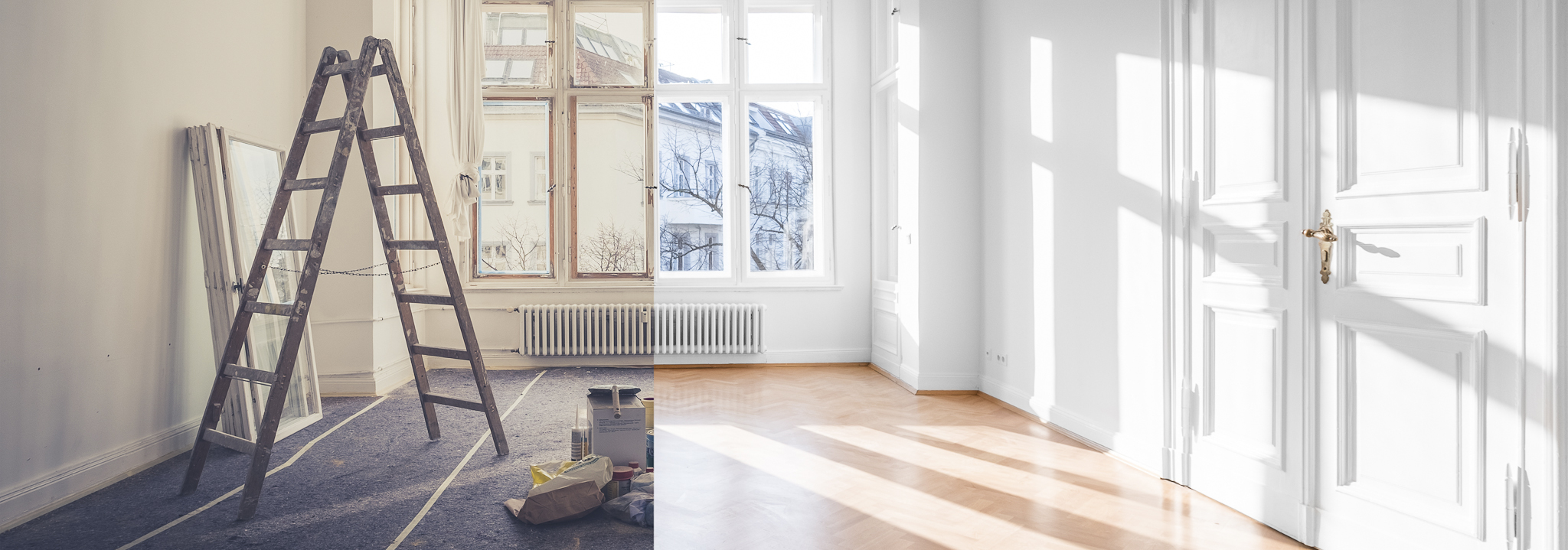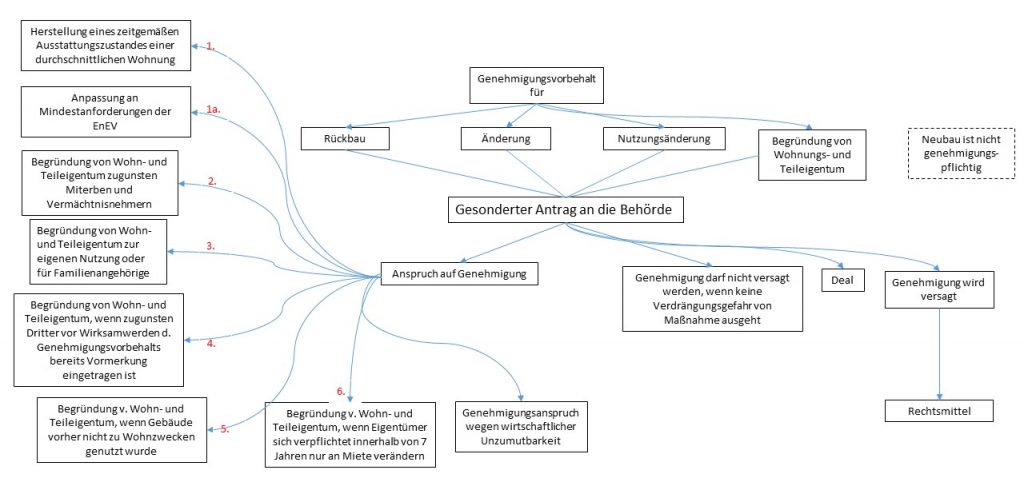Development of real estate in social preservation areas
The deconstruction, change and change of use as well as the establishment of residential and partial ownership is subject to the approval of the district/municipality in social preservation areas, cf. section 172 (1) no. 2 BauGB. Not all measures are eligible for approval. The following overview shows the individual scenarios that are possible in the approval procedure. Since the approval procedure is very complex and there are also considerable legal uncertainties on the part of the district/municipality with regard to the approvability of the individual measures, it is advisable to obtain sound legal advice as early as the application stage.
1. demolition / deconstruction
In milieu protection areas, approval for a demolition project must be granted if it is no longer reasonable to maintain the facility. However, high requirements are attached to the assumption of economic unreasonableness. In this respect, what has been said about subdivision applies. It depends on the state of preservation and the preservation possibilities of the property. For economic unreasonableness, the costs of maintenance and management must permanently and noticeably exceed the income.
2. conversion/extension
In areas under milieu protection, conversion or expansion is only permitted within narrow limits. Section 172 (4) sentence 3 BauGB lists constellations in which approval must be granted:
- The creation of a contemporary standard of furnishings and fittings for an average apartment, taking into account the minimum requirements of the building code.
When determining what constitutes a contemporary standard of furnishings and fittings for an average apartment, it is problematic what is to be used as a comparison here. In some cases, the milieu protection area itself is used as a basis. However, it is also argued that the protected residential area should not be used as a basis, but that a general standard of comparison should be applied. - The adaptation to the minimum requirements of the Energy Saving Ordinance must be explicitly approved.
Further, according to case law, approvable:
- In the case of owner-occupancy by the owner or his family members after the modernization measures have been carried out, the owner's privilege under Art. 14 of the German Basic Law also requires approval of a higher-than-average standard of fittings and fixtures. However, the future owner-occupancy must be ensured for this purpose. The holding period of seven years from Section 172 (4) sentence 3 no. 6 BauGB is usually used as the period for owner occupation.
- Creation of new living space/attic conversion.
- Addition of elevators to new residential development and when construction is required by the building code.
3. change of use
In the case of a change of use, the conversion of commercial space to residential space is possible without any problems. On the other hand, a change of use from residential to commercial space cannot be approved, as this would deprive residential space.
4. division
For the establishment of residential and partial ownership, the required approval pursuant to Section 172 (4) sentence 2 BauGB, among other things, is only to be granted if a refusal is economically unreasonable for the owner. The assumption of economic unreasonableness is subject to high requirements and must always be determined on a property-by-property basis. It depends on the specific property and its utilization, but not on the personal and economic circumstances of the owner.
In addition, Section 172 (4) sentence 3 BauGB lists cases in which approval must be granted for the establishment of residential and partial ownership. Approval is required, for example, for the establishment of residential property if the dividing owner undertakes to sell residential property/partial property only to tenants within seven years. This also becomes important in connection with the averting agreement on the right of first refusal explained above. Very often, these expressly approvable projects are excluded in the averting agreement.
For owners of properties that are not yet in milieu protection areas, it is therefore important to examine the efforts of the district concerned and make appropriate preparations.
5. the approval criteria of the Berlin districts
The districts in Berlin decide on their own approval criteria for the uniform processing of permit applications for projects subject to approval in the milieu protection areas. The approval criteria are intended to specify the legal requirements. They represent internal instructions for the authorities on how to decide on permit applications. Differences may arise from district to district. As an example, the criteria of the district of Neukölln from the district authority resolution of November 7, 2017, are mentioned when a permit should not be issued:
- Installation/addition of particularly high-cost elevators/facade sliders.
- Second bath/second shower/second toilet; except for dwellings with four or more living rooms if the number of living rooms is not reduced by the installation.
- Non-required floor plan changes; especially if the living area and number of rooms are changed (eat-in kitchens, changing bathrooms that are already fully equipped).
- Apartment divisions and apartment mergers and namely also in case of merging of already existing with newly created living space (attic maisonette unit).
- Measures to save energy that go beyond the minimum requirements of the EnEV.
- Addition of particularly costly first balconies; creation of balconies, loggias, terraces and conservatories if the apartment already has a balcony or terrace. First balconies that exceed a floor area of 4 sqm are not eligible for approval.
- Particularly high-quality apartment and building equipment: underfloor heating, video intercom, installation of an indoor fireplace, high-quality bathroom and kitchen equipment, floor-to-ceiling windows, representative entrance areas and staircases.
- Creation of parking facilities belonging to the apartment.
- Demolition of residential buildings or dwelling units unless it is no longer reasonable to maintain the structure.
- Change of use from residential to commercial.
6. the excessive denial of permits by the Berlin districts
The approval practice of the districts shows an excessive interpretation of the approval prohibitions. In Pankow, the minimal enlargement of a so-called hose bath from 75 to 110 cm in width was initially rejected(see Case Law: Floor Plan Change: Enlargement of a Hose Bath 1.0). The widening is necessary for the freedom of movement of the tenants, so that they do not have to climb over the toilet to use the shower. The width dimensions of 75 cm are still from the 19th century, when apartments had no interior bathrooms, and tenants had helped themselves with a minimal separation to the kitchen in shower tray width. According to the district of Pankow, this is to remain so. A widening of the bathroom - which only means an adjustment to the normal equipment standard - cannot be approved according to the district of Pankow. Elsewhere, again to create interior bathrooms, an apartment consolidation was also approved. Here, however, the case law of the Berlin Administrative Court has changed. The enlargement of a hose bath to 110cm width can now be approved if the freedom of movement for the residents is lacking in this respect(see Case Law: Floor Plan Change: Enlargement of a Hose Bath 2.0).
There are usually always problems with the merging of housing. In the opinion of the districts, two small (affordable) apartments are thereby taken away from the protected area, creating an expensive large apartment. Even if the denial of approval would displace a family firmly rooted in the milieu protection area because they would have to move to a completely different residential area, this does not change this practice. In this case, the approval practice already contradicts the goals of the Milieu Protection Ordinance. A negative decision on this matter by the Berlin Administrative Court was confirmed by the Berlin Brandenburg Higher Administrative Court(see Case Law: No Merging of Apartments). In another case, a decision by the administrative court was required before the addition of elevators could be approved(see Case Law: Addition of Elevators Permitted).
7. the so-called "prescription" rents
In the approval process, some districts use so-called "ordinance rents" as a standard of review. In the "ordinance rents", the district has determined the respective rents of the milieu protection area. If the rent to be achieved after modernization is higher than these "ordinance rents," this is an indication for the district that there is a threat of displacement in the milieu protection area. As part of the approval process, the district then tries to oblige the applicant to waive the allocation of modernization costs to the rent. However, this is not permissible. The district cannot prevent the apportionment of modernization costs in the case of modernization measures that merely correspond to contemporary fittings. The same applies to the threat of refusing approval if a corresponding rent commitment is not signed. Here, too, a comprehensive legal examination should first be carried out and, if necessary, the request for approval should be pursued before the administrative court.

